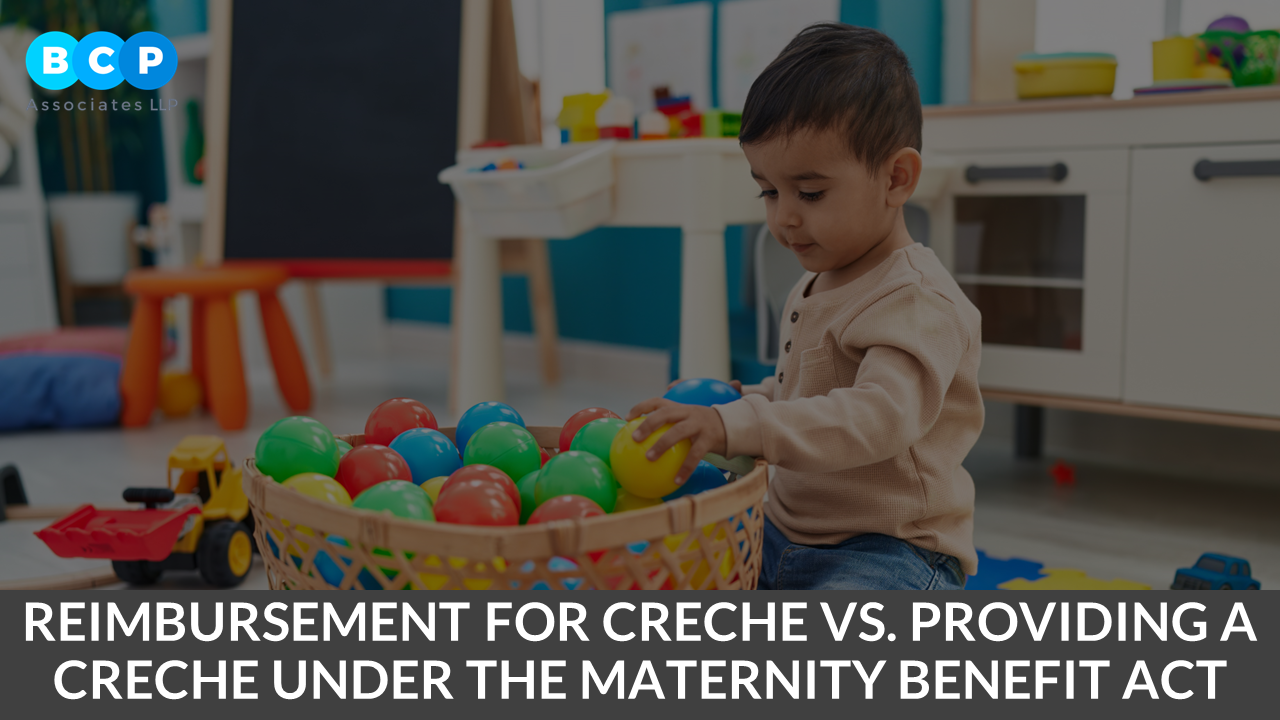
Introduction
The debate between providing a creche and offering an alternative arrangement is important to understand from the perspective of compliance. The question becomes how can organisations best support their employees while complying with legal requirements. The Maternity Benefit (Amendment) Act, 2017 introduced significant changes to enhance maternity benefits and support working mothers, including changes pertaining to creche facilities in organisations. With an increasing number of women in the workforce, finding the right balance between legal obligations and employee preferences is essential.
This article discusses the complexities of reimbursement versus the provision of a creche, addressing who should provide creche facilities, possible exemptions and the benefits earned.
Why Creche?
A creche facility is a designated childcare center provided by employers for the children of their employees. It is typically located within or near the workplace and offers a safe, supervised environment where children can stay during the working hours of their parents. This helps working parents, especially mothers, balance work and home life while providing a safe, nurturing environment for their children.
In the case of Bahra University vs. Pooja Bhardwaj and Ors [CWP Number 2955 of 2019], the Himachal Pradesh High Court ruled in favour of a woman employee who chose not to return to work due to the absence of a creche facility, directing the employer to pay her leave salary with interest for the said duration. This case underscores the legal and ethical obligations of employers to provide adequate childcare support.
Applicability of Creche Under the Maternity Benefit Amendment Act, 2017
Section 11A of the Maternity Benefit Act, 1961 mandates that:
“Every establishment having fifty or more employees shall have the facility of crèche within such distance as may be prescribed, either separately or along with common facilities: Provided that the employer shall allow four visits a day to the creche by the woman, which shall also include the interval for rest allowed to her.”
The section explicitly mandates that any establishment with 50 or more employees must provide creche facilities. This requirement is designed to ensure gender-neutral support for both mothers and fathers. The use of the term ’employees’ is intentional, reflecting the recognition that childcare responsibilities are shared by both parents. Therefore, even establishments with only male employees are obligated to provide a creche facility, allowing fathers to access childcare support.
Alternatives to a Creche
The Maternity Benefit Act, 1961 casts the obligation on employers to offer creche facilities to working parents, as outlined in Section 11A, and does not explicitly deal with ‘reimbursement’ as an alternative to providing creche facilities.
Given this understanding, the provision of reimbursement may technically be in non-compliance with the law. However, Section 27(2) of the Maternity Benefit Act, 1961, provides an opportunity for women employees to negotiate with their employer to secure rights or privileges that are more favourable to them than those guaranteed by the Act, without any restrictions.
If a creche facility is not a feasible option or if the option of reimbursement appears to be more favourable to the woman employee, the employer may consider offering reimbursement at the employee’s request.
Ensuring Creche Compliance: Employer Obligations and Alternatives
Employers must be proactive in ensuring compliance with the provisions of Section 11A. This involves not only establishing the creche facility but also adhering to the prescribed standards regarding its location, maintenance, and staffing. Failure to comply with these requirements may result in penalties for the employer.
On the other hand, employees should be aware of their rights under the Maternity Benefit Act. If an employee opts for reimbursement or any additional benefits under Section 27(2) of the Maternity Benefit Act, 1961, it is critical that the prescribed amount is paid promptly, and the employee is informed of the same.
Conclusion
Failure to provide the creche benefit may expose the employer to penal consequences under the Maternity Benefit Act, 1961. Providing a creche is not only a legal obligation under the Act, but it is also a measure for nurturing an inclusive and supportive workplace environment. A creche benefits women employees by allowing them to return to work without compromising their childcare responsibilities, thereby reducing stress and improving their overall well-being and productivity. Although the Act does not explicitly provide for reimbursement, employees can request this option for convenience, allowing for flexible solutions that cater to individual needs. Ultimately, the employer must balance safeguarding employees’ interests with complying with statutory obligations, taking into account the employer’s risk appetite.
-Shreya Tamanna,
Advocate & Associate
-Sourabha Venkatesh,
Advocate